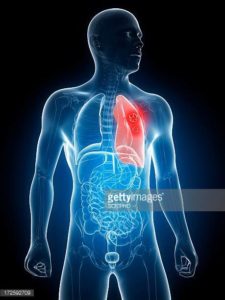Furthermore, vitamin D or its analogs, alone or in combination with cytotoxics, have potential in the treatment of lung cancer.
Vitamin D doesn’t fight lung cancer in the traditional sense. It doesn’t fight my cancer, multiple myeloma in the traditional sense either. I’ve taken 3000 mg. of vitamin D daily for years. And I’ve remained in complete remission from my “incurable” cancer, multiple myeloma since 1999.

If those sentences above don’t seem to fit together, let me explain. Like the study linked and excerpted below explains, vitamin D “plays a beneficial role in pulmonary inflammation.” That’s what they call faint praise.
The fact is, science doesn’t really seem to understand why vitamin D helps lung, blood, breast, etc. cancer patients. But it does. Science does identify vitamin D as an integral component of your therapy if you are a cancer survivor.
I’m going to continue to take 3000 mg of vitamin D daily and I plan to remain in complete remission from my incurable cancer. If it ain’t broke don’t fix it.
Do you have lung cancer? What stage? Please scroll down the page, post a question or comment and I will reply to you ASAP.
Thank you,
David Emerson
- Cancer Survivor
- Cancer Coach
- Director PeopleBeatingCancer
Recommended Reading:
Vitamin D: potential in the prevention and treatment of lung cancer.
“Vitamin D is a steroid hormone traditionally recognized for maintaining calcium and phosphorus homeostasis in the body. However, it is now widely accepted that it exerts several extraskeletal actions, including anti-tumorigenic and immunomodulatory effects in vitro and in vivo…
There is now a huge interest in studying the modes of action of vitamin D in a wide range of infectious and chronic disease settings and its potential in cancer prevention and treatment is currently under detailed investigation…
In relation to the lung, evidence from observational studies, animal models and in vitro cell culture suggest that vitamin D may play a beneficial role in pulmonary inflammation.
Furthermore, vitamin D or its analogs, alone or in combination with cytotoxics, have potential in the treatment of lung cancer. Vitamin D is converted to its active form locally in the lung, suggesting that it may play an important role in lung health…”
“Results: Of the 91 patients enrolled in the study, 85 % had hypovitaminosis D and 41 % had hypovitaminosis C. Plasma VDBP concentrations were in the normal range. The vitamin D load increased the average plasma 25(OH)D concentration to 116 ± 34 nmol/L (mean ± SD); the median concentration was 122 nmol/L (interquartile range 103–134); VDBP concentrations did not change. Final plasma 25(OH)D concentrations were subnormal (<75 nmol/L) for 13 % of the patients and sub-target (<120 nmol/L) for 44 % of them. In most cases, subnormal and sub-target 25(OH)D concentrations were attributable to obesity and/or a low baseline 25(OH)D concentration. Mood and symptom scores did not change significantly throughout the 3-week protocol.
Conclusion: Hypovitaminosis D and C are very common in outpatients with advanced lung cancer. A vitamin D load of 20,000 IU per day for 14 days failed to achieve the target concentration in 44 % of the participants in this trial. These results suggest that a loading dose of 30,000 IU per day for 14 days would be safe and effective for patients who are obese or at risk of severe hypovitaminosis D. The preliminary nature of the study design, and the failure to achieve target 25(OH)D concentrations for a large proportion of the patients, do not allow any firm conclusion about the clinical effects of correcting hypovitaminosis D in this patient population. Nevertheless, no evidence was obtained that partial correction of hypovitaminosis D greatly improved mood, reduced distress or relieved cancer-related symptoms. This trial was registered at clinicaltrials.gov as NCT01631526.




